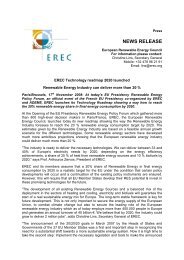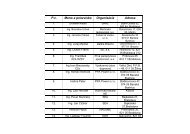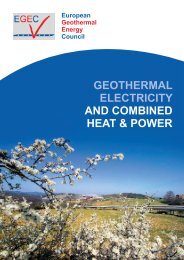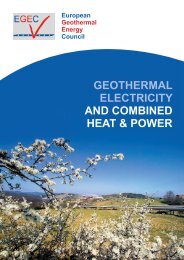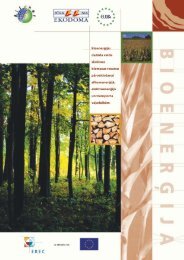EREC Position Paper on Biofuels - European Renewable Energy ...
EREC Position Paper on Biofuels - European Renewable Energy ...
EREC Position Paper on Biofuels - European Renewable Energy ...
You also want an ePaper? Increase the reach of your titles
YUMPU automatically turns print PDFs into web optimized ePapers that Google loves.
<strong>European</strong> <strong>Renewable</strong> <strong>Energy</strong> Council<br />
For informati<strong>on</strong> please c<strong>on</strong>tact:<br />
Oliver Schäfer, Policy Director,<br />
Mob: +32 496 65 28 37<br />
Email: Schaefer@erec.org<br />
<str<strong>on</strong>g>EREC</str<strong>on</strong>g> POSITION PAPER ON BIOFUELS<br />
A critical energy source and a historic opportunity for the EU<br />
Brussels, 20 th of June 2008. Seemingly every day, oil prices reach new record levels and show no signs<br />
of stabilising. 1 Producti<strong>on</strong> from traditi<strong>on</strong>al oil fields is declining and centering <strong>on</strong> politically unstable<br />
regi<strong>on</strong>s of the world. Oil companies are turning to exploiting oil from costly and more carb<strong>on</strong> and<br />
water intensive sources, such as tar sands, and in ever more envir<strong>on</strong>mentally sensitive areas. 2 The<br />
c<strong>on</strong>tinuing growth in oil c<strong>on</strong>sumpti<strong>on</strong> also produces increased emissi<strong>on</strong>s of greenhouse gases. CO 2<br />
emissi<strong>on</strong>s, especially in the road transport sector have reached absolutely intolerable levels. To curb<br />
these problems immediate acti<strong>on</strong> is needed.<br />
<strong>Biofuels</strong> have a major role to play both in improving energy security and tackling climate change.<br />
They also provide an opportunity for rural areas to break the cycle of poverty both in the developed<br />
and developing world. However, biofuels have come under serious attack. <str<strong>on</strong>g>EREC</str<strong>on</strong>g> regrets that the<br />
debate about biofuels has become emoti<strong>on</strong>al and irrati<strong>on</strong>al, peaking in the proposal by the EP lead<br />
rapporteur to delete the 10% binding target for renewables in transport. <str<strong>on</strong>g>EREC</str<strong>on</strong>g> firmly believes that<br />
biofuels are a crucial part of our strategy in meeting the renewables target and thus in meeting GHG<br />
reducti<strong>on</strong> targets and reducing the EU’s import dependency. From an internati<strong>on</strong>al envir<strong>on</strong>mental<br />
perspective it is absolutely imperative to develop <strong>European</strong> standards and <strong>European</strong> biofuels<br />
producti<strong>on</strong>. The latter <strong>on</strong>e can be significantly developed <strong>on</strong>ly with the binding target for biofuels.<br />
The future Directive needs to reflect this situati<strong>on</strong>.<br />
Challenges in the transport sector<br />
CO 2 reducti<strong>on</strong>. The transport sector is a major c<strong>on</strong>tributor to GHG emissi<strong>on</strong>s. Including oil refinery<br />
emissi<strong>on</strong>s, the transport sector, today, accounts for more than a quarter of all Europe’s greenhouse<br />
gas emissi<strong>on</strong>s. Much worse is the fact that these emissi<strong>on</strong>s have been rising remorselessly. They are<br />
1 132 US$/bbl <strong>on</strong> 18 th of June.<br />
2 The emissi<strong>on</strong>s to produce 1 barrel of oil from oil or tar sands are <strong>on</strong> average 3 times higher that the emissi<strong>on</strong>s from<br />
c<strong>on</strong>venti<strong>on</strong>al oil. See: page 22 in “Oils Sands forever, the envir<strong>on</strong>mental implicati<strong>on</strong>s of Canada’s oil sands rush”, Dan<br />
Woynilliwicz, November 2005.
now 26% higher than they were in 1990. <strong>Biofuels</strong>, together with increased transport efficiency, fuel<br />
efficiency and savings are at present the <strong>on</strong>ly immediately available and viable alternative to fossil<br />
fuels capable of reducing GHG emissi<strong>on</strong>s significantly and with immediate effect. <str<strong>on</strong>g>EREC</str<strong>on</strong>g> calls up<strong>on</strong> the<br />
EU decisi<strong>on</strong>-makers not to let the chance pass by to create a viable legislative envir<strong>on</strong>ment<br />
encouraging renewable energy soluti<strong>on</strong>s in the transport sector. Only the binding 10% target can<br />
establish a framework which enables Member States to deliver <strong>on</strong> using renewable fuels in this<br />
sector (and deliver <strong>on</strong> replacing fossil fuels in the transport sector).<br />
<strong>Energy</strong> security. At present, the EU is importing 98% of its transport fuel needs from third countries,<br />
most of which are located in politically unstable regi<strong>on</strong>s. The increasing world demand is pushing oil<br />
prices to historic maxima and <strong>on</strong>ly developing an alternative fuels market can compensate increasing<br />
oil costs and alleviate the oil bill. Domestic biofuel producti<strong>on</strong> has a big potential in reducing the<br />
EU’s heavy dependency <strong>on</strong> crude and fuel imports. In the wake of a looming peak in oil, leading oil<br />
companies are exploring more and more envir<strong>on</strong>mentally harmful crude from tar sand, shale and<br />
the deep sea. Specifically biofuels can help to cushi<strong>on</strong> the negative impact of this growing shortage.<br />
<str<strong>on</strong>g>EREC</str<strong>on</strong>g> would like to stress that sustainable biofuels produced in the EU can deliver a c<strong>on</strong>siderable<br />
c<strong>on</strong>tributi<strong>on</strong> to addressing this energy security c<strong>on</strong>cern in EU Member States.<br />
10% is part of the 20% target<br />
<str<strong>on</strong>g>EREC</str<strong>on</strong>g> applauds the Commissi<strong>on</strong>, which showed extreme diplomatic sensitivity in establishing the<br />
fragile equilibrium of nati<strong>on</strong>al targets for 2020. The 10% target is an essential, necessary part of the<br />
overall 20% target for renewable energy by 2020.<br />
10% binding target and sustainability – EU as a leading example for sustainable producti<strong>on</strong><br />
As the experience with the existing biofuels Directive shows, fuel distributors (oil companies) <strong>on</strong>ly<br />
use biofuels if there is an ec<strong>on</strong>omic advantage (fiscal incentive) or because they are forced to use<br />
them. Precisely the binding nature of the biofuel target has triggered the very important debate <strong>on</strong><br />
sustainability criteria and a certificati<strong>on</strong> scheme. Notwithstanding the fact that EU biofuel producers<br />
comply already today with the highest possible global farming standards, <strong>on</strong>ly the EU biofuel<br />
objective justifies the building of a sustainability and certificati<strong>on</strong> scheme. This scheme could serve<br />
as an example for biofuel producti<strong>on</strong> standards all over the world. The industry is willing to commit<br />
to str<strong>on</strong>g and reas<strong>on</strong>able sustainability standards since we do not want to repeat the mistakes of the<br />
oil industry. If, however, biofuels will <strong>on</strong>ly be used marginally because the 10% binding target has<br />
been deleted, the sustainability rules will lose their rais<strong>on</strong> d’être. <str<strong>on</strong>g>EREC</str<strong>on</strong>g> fears that in such a case the<br />
EU would miss a great opportunity to develop similar sustainability schemes for fossil fuel and for all<br />
other uses of bioenergy and crops in general. Therefore <str<strong>on</strong>g>EREC</str<strong>on</strong>g> urges the EU to set a new<br />
sustainability standard for own producti<strong>on</strong> and import, in a world where over 90% of all biofuels are<br />
produced and used outside the EU – mostly without any envir<strong>on</strong>mental or social standards. It is a<br />
historic opportunity!
Food, feed and biofuels<br />
<strong>Biofuels</strong> feedstock. Bioethanol in Europe is mainly produced from cereals (around 2 mln t<strong>on</strong>nes) 3<br />
with wheat as a dominating feedstock. Due to str<strong>on</strong>g cereal price increases over the last 12 m<strong>on</strong>ths<br />
sugar beet use is growing. 4 Currently, <strong>on</strong>ly 1.6% of the total EU produced cereals output is used to<br />
make fuel ethanol. By far the biggest share of EU grain producti<strong>on</strong> serves to feed cattle (58,1%). The<br />
sec<strong>on</strong>d biggest c<strong>on</strong>sumer of cereals is the food industry (22.1%). 5 Globally, biofuels are currently<br />
using about 2% of the world’s grain producti<strong>on</strong>. <strong>European</strong> biodiesel producti<strong>on</strong> currently accounts<br />
for about 2% of global oilseed demand.<br />
Furthermore, it is worthwhile noting that barely 3% of EU imported palm oil is used to produce<br />
biodiesel. The li<strong>on</strong>’s share imported into the EU is destined for the food industry. Blaming biofuels<br />
for the global commodity crisis may provide an easy argument, but <strong>on</strong>ly distracts attenti<strong>on</strong> from the<br />
root causes of the problem. The principal drivers for the recent surge in food prices is explained as a<br />
combinati<strong>on</strong> of demand growth especially in Asia, because of the yield reducti<strong>on</strong> due to weather<br />
related poor harvest (floods, drought)in some key producing countries, by food export restricti<strong>on</strong>s<br />
by some nati<strong>on</strong>al governments, of financial speculati<strong>on</strong> and also, of course, due to high oil prices.<br />
High agricultural prices will give additi<strong>on</strong>al incentives to restart agriculture in rural areas all over the<br />
world and especially in developing countries.<br />
Oil price. <str<strong>on</strong>g>EREC</str<strong>on</strong>g> wants to underline that hunger and malnutriti<strong>on</strong> in the developing world are not due<br />
to a lack of food but are a result of poverty. The spiraling price of oil deepens poverty not just by<br />
driving up food producti<strong>on</strong> costs (especially fertilizer and logistics), but in a pervasive manner that<br />
touches all parts of the ec<strong>on</strong>omy. Without biofuels, oil prices would be even higher. This simple fact<br />
has been overlooked by much of the media. According to Merrill Lynch, oil and gasoline prices would<br />
be about 15 per cent higher if biofuels weren't available. Moreover, some 70 per cent of the world’s<br />
hungry live in rural areas, exactly where biofuels (can) generate most ec<strong>on</strong>omic wealth.<br />
Land availability. Less than 1 per cent of available global agricultural land is used at the moment for<br />
the producti<strong>on</strong> of biofuels. The United Nati<strong>on</strong>s Food and Agriculture Organisati<strong>on</strong> (FAO) forecasts<br />
that this will rise to <strong>on</strong>ly 2 per cent by 2030. In the EU a lot of land will be freed due to the reform of<br />
the EU sugar regime. The sugar quota will be reduced by approximately 6 mln t<strong>on</strong>nes or 0.9 mln ha<br />
of sugar beet. If this sugar beet was turned into ethanol it would result in close to 6 bln litres of<br />
ethanol. By comparis<strong>on</strong>: In 2007 the EU produced 1.77 bln litres of ethanol and the 10% target for<br />
gasoline equals an estimated 18 bln litres. So with EU-grown sugar beet al<strong>on</strong>e (and with land which<br />
is already now being cultivated!) the EU could reach 1/3 of its 2020 fuel ethanol need.<br />
Fuel and feed producti<strong>on</strong>. <str<strong>on</strong>g>EREC</str<strong>on</strong>g> feels that an important quality of EU biofuels producer is being<br />
neglected in the debate about food and fuel. Biofuel producti<strong>on</strong> has a protein rich by-product that<br />
replaces imported soy meal or cake. The EU depends heavily <strong>on</strong> soy to feed its animals. Currently the<br />
EU imports 80% of its vegetable proteins (or 40 mln t<strong>on</strong>nes). In the case of bioethanol producti<strong>on</strong>,<br />
3 Total EU cereal c<strong>on</strong>sumpti<strong>on</strong> for the seas<strong>on</strong> 2007/08 was set at 270 mln t<strong>on</strong>nes. Source: EU Cereals Management<br />
Committee.<br />
4 In Germany for instance, the share of sugar beet as bioethanol feedstock increased from 0,03 mln t<strong>on</strong>nes in 2006 to 0,2<br />
mln t<strong>on</strong>es in the beginning of 2008. In Germany, the share of cereal as raw material for bioethanol producti<strong>on</strong> decreased<br />
substantially from approximately 98% in 2006 to approximately 54 % in 2008 (Source: LAB).<br />
5 Source: <strong>European</strong> Commissi<strong>on</strong>, Management Committee <strong>on</strong> Cereals, harvest 2007/2008.
1/3 of the crop goes to the feed/food chain as protein c<strong>on</strong>centrated animal feed (DDGS). Each<br />
7.5t/ha of wheat will generate 2,700 litres of ethanol and 1 t<strong>on</strong>ne of protein. Also the producti<strong>on</strong> of<br />
biodiesel yields valuable by-products such as protein-rich rape cake/meal and glycerine. <str<strong>on</strong>g>EREC</str<strong>on</strong>g> calls<br />
up<strong>on</strong> the EU legislators not to blackmail biofuel producers prematurely without c<strong>on</strong>sidering their<br />
potential to feed and fuel.<br />
2 nd generati<strong>on</strong> biofuels. The so-called advanced or 2 nd generati<strong>on</strong> biofuels have a great potential in<br />
terms of optimal use of raw material, increased GHG savings and use of less fertile land. However,<br />
before 2 nd generati<strong>on</strong> will become commercially available <strong>on</strong> a large scale c<strong>on</strong>siderable efforts in<br />
terms of R&D and investment capital are still needed. <str<strong>on</strong>g>EREC</str<strong>on</strong>g> acknowledges and supports the political<br />
desire to come to a next or sec<strong>on</strong>d generati<strong>on</strong> of biofuels. <str<strong>on</strong>g>EREC</str<strong>on</strong>g> would like to underline that 2 nd<br />
generati<strong>on</strong> biofuels will <strong>on</strong>ly become a reality if there is a well-developed 1 st generati<strong>on</strong> biofuel<br />
industry that can generate the funds to invest in 2 nd generati<strong>on</strong> and favourable government and EU<br />
policy that stimulates and funds research & development of new technologies as well as<br />
dem<strong>on</strong>strati<strong>on</strong> and introducti<strong>on</strong> <strong>on</strong> the market.<br />
In c<strong>on</strong>clusi<strong>on</strong>, <str<strong>on</strong>g>EREC</str<strong>on</strong>g> urges MEPs and the Council to maintain the 10% binding target for renewable<br />
energy sources in the transport sector.<br />
---------------------------------------------------------------------------------------------------------------------<br />
<str<strong>on</strong>g>EREC</str<strong>on</strong>g>, the <strong>European</strong> <strong>Renewable</strong> <strong>Energy</strong> Council, is the umbrella organisati<strong>on</strong> of the major <strong>European</strong> renewable<br />
energy industry, trade and research associati<strong>on</strong>s active in the field of photovoltaics, small hydropower, solar<br />
thermal, bioenergy, ocean & marine, geothermal, wind energy, c<strong>on</strong>centrated solar power and biofuels. It<br />
represents an industry with an annual turnover of more than 40 billi<strong>on</strong> € and more than 350.000 employees.<br />
<str<strong>on</strong>g>EREC</str<strong>on</strong>g> represents:<br />
<br />
<br />
<br />
<br />
<br />
<br />
<br />
<br />
<br />
<br />
<br />
<br />
AEBIOM (<strong>European</strong> Biomass Associati<strong>on</strong>)<br />
eBIO (<strong>European</strong> Bioethanol Fuel Associati<strong>on</strong>)<br />
EGEC (<strong>European</strong> Geothermal <strong>Energy</strong> Council)<br />
EPIA (<strong>European</strong> Photovoltaic Industry Associati<strong>on</strong>)<br />
EREF (<strong>European</strong> <strong>Renewable</strong> Energies Federati<strong>on</strong>)<br />
ESHA (<strong>European</strong> Small Hydropower Associati<strong>on</strong>)<br />
ESTELA (<strong>European</strong> Solar Thermal Electricity Associati<strong>on</strong>)<br />
ESTIF (<strong>European</strong> Solar Thermal Industry Federati<strong>on</strong>)<br />
EUBIA (<strong>European</strong> Biomass Industry Associati<strong>on</strong>)<br />
EU-OEA (<strong>European</strong> Ocean <strong>Energy</strong> Associati<strong>on</strong>)<br />
EUREC Agency (<strong>European</strong> <strong>Renewable</strong> <strong>Energy</strong> Research Centres Agency)<br />
EWEA (<strong>European</strong> Wind <strong>Energy</strong> Associati<strong>on</strong>)


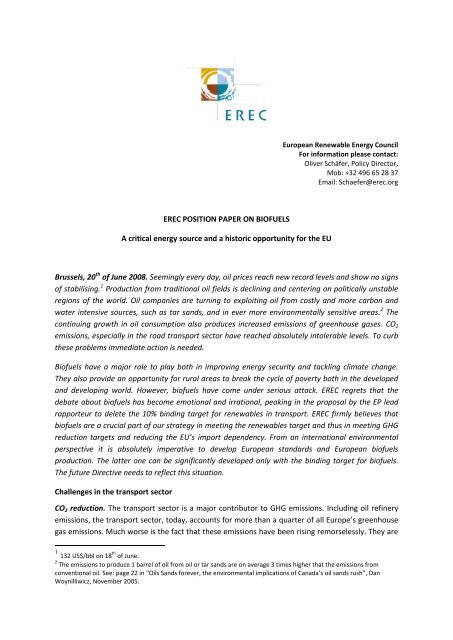

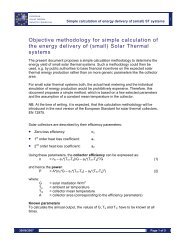
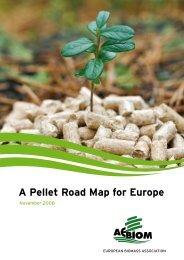
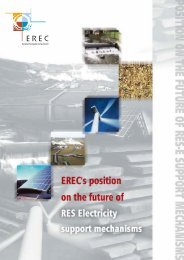
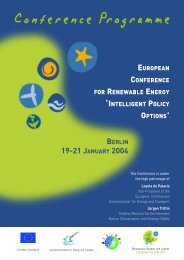
![Energy [R]evolution - Greenpeace](https://img.yumpu.com/47174859/1/184x260/energy-revolution-greenpeace.jpg?quality=85)
